ICMI News March 2021
ICMI Newsletter March 2021
Editors:
Jean-Luc Dorier (ICMI Secretary General)
Merrilyn Goos (ICMI Vice President)
Lena Koch (ICMI Administrative Manager)
Email addresses:
icmi.secretary.general@mathunion.org
merrilyn.goos@ul.ie
icmi.administrator@mathunion.org
CONTENTS
- From the desk of Frederick Leung, new ICMI President
- ICMI AMOR
- Short report on progress of ICMI Study 25
- Once upon a time… Historical vignettes from the Archives of ICMI: Two or three reflections inspired by the postponement of ICME-14
- ICME-14 updates
- Three CANP SpringerBriefs Publications are now available open access
- ICMI Affiliated Organizations
- The Commission for Developing Countries of the IMU – Mission and activities
- Cheryl Praeger’s distinction as Companion of the Order of Australia
- Alicia Dickenstein receives the L'Oréal-UNESCO International Award For Women in Science
- Participate in the International Day of Mathematics 2021 (IDM 2021)
- Conferences to come
1. From the desk of Frederick Leung, new ICMI President
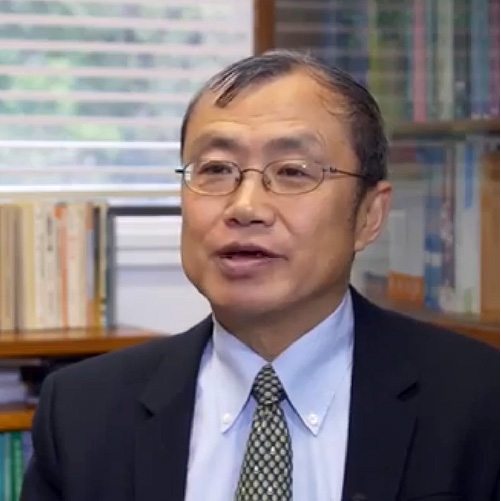
As ICMI ushers in a new four-year term for the Executive Committee (EC), I am writing to convey greetings to the worldwide mathematics education community on behalf of the new EC. May the year of 2021, and the succeeding three years, be healthy, peaceful and productive for you! I am taking up the Presidency of ICMI with awe and humility, fully aware of the challenges that lie ahead of me and the rest of the international mathematics education community. In facing these challenges, I am blessed with the firm and sound foundation laid down by our predecessors – the past Presidents and EC members of ICMI. The new EC will certainly be building on their good work in furthering the missions of ICMI. I am also blessed with a strong and diverse team of EC members as I understand how important team-work is in meeting the many challenges ahead. You can find more information about our EC members in this website: https://www.mathunion.org/icmi/organization/icmi-executive-committee/icmi-ec-2021-2024
Let me share with you briefly my vision for mathematics education in the coming years. “The International Commission on Mathematical Instruction is a worldwide organization devoted to research and development in mathematical education at all levels … (and) to promote international cooperation in mathematics”. In achieving this mission of ICMI, I think our first and foremost task is to establish mathematics education more solidly as an academic discipline. We as an organisation should encourage rigorous research and promote high standards in research methodology. Based on scholarly research, we should facilitate and encourage sharing of best practices and cross-fertilization of ideas, while focusing on capacity building. And in the course of doing so, we should be sensitive to contextual and cultural differences in different countries.
Our particular challenge is that we are facing a different world from the one a few years ago. The obvious challenge that comes to mind immediately is COVID-19, but our world is facing other grave challenges as well that have implications for mathematics education. As we all know, COVID-19 is affecting school education all over the world, and normal routine classroom teaching is seriously hampered. But the pandemic also brings opportunities. Many teachers around the globe are exploring the use of ICT for mathematics teaching and learning remotely. We had been talking about distance learning and the potential benefits that it might bring about (e.g., the potential of reaching the underprivileged who, because of one reason or another, could not benefit from quality face-to-face teaching and learning) for decades, but COVID-19 has prompted us to at least experiment with and explore the potentials of distance learning to “real” students. Unfortunately, the effective use of ICT for remote teaching and learning, especially for the underprivileged, still remains a potential at the moment. Actually the evidence so far is that COVID-19 has led to even greater inequality. The social distancing and lock-down measures in most countries have meant that alternative modes of schooling are needed, and in this situation the underprivileged have suffered much more than the rich who have the resources to access alternative arrangements - the difficulty of access to wide bandwidth internet is just one simple example. (This is analogous to the uneven access to medical care of the haves and the have-nots in many countries, especially when some countries are already starting COVID-19 vaccination programs.) We do not yet have a lot of concrete data on how mathematics education of the underprivileged has been affected by COVID-19, and a Discussion Group in ICME-14 will be devoted to discussing this issue. In this time of crisis, ICMI as a community must reaffirm its mission of bringing about more equity in (mathematics) education opportunities for children in all corners of the world.
One way of achieving more equity is to support mathematics education in disadvantaged countries, and ICMI has been attempting to do this through our Capacity and Networking Project (CANP). One lesson we learned from COVID-19 is that we are living in an inter-dependent world. Just as immunity in one country is not enough to contain the pandemic, merely improving the quality (and quantity) of mathematics education in our own country is not enough for the whole humanity to advance in mathematics learning. And in supporting mathematics education in different countries, we need to take their different cultural contexts into consideration. We must understand and respect different cultural traditions: we have much to learn and benefit from cultural diversity.
In trying to attain more equity in mathematics education, we need to make sure that this is not achieved at the expense of quality or excellence. We hope to offer the best mathematics education to children all over the world, and in sharing best practices, such practices should be based on excellent research. In fact, excellence in scholarship is another core value of ICMI. ICMI should take the lead in setting standards of excellence in research and practices in mathematics education. In this regard, the ICMI awards - the Felix Klein Award, Hans Freudenthal Award and Emma Castelnuovo Award - are one way of recognizing scholastic excellence.
As mentioned above, COVID-19 has greatly disrupted educational activities around the world. In the realm of mathematics education, many cross-national events and activities have been adversely impacted in the past year or so. For ICMI, the most conspicuous disruption is the deferral of ICME-14 by one year, and even after deferral, the congress will only be held in a hybrid mode (see another item in this Newsletter). Holding a large-scale international conference with participants from different time zones is a huge undertaking, and I applaud the efforts put in by the Chair and the Local Organizing Committee (LOC) of ICME-14 in meeting the challenge. The ICMI EC will give our full support to the Shanghai host as they embark on this difficult task, and I hope the whole ICMI community will likewise render your strong support to the ICME-14 organizer. No doubt this first-of-its-kind mode of ICME will cause more inconvenience to some participants than others. I plead for your understanding and forbearance while the ICME-14 LOC struggles to overcome all sorts of difficulties in organizing the conference. Your support and appreciation of their work are extremely important to them in organizing a successful and special ICME.
Other than COVID-19, there are many other formidable challenges on a global scale that are confronting us: climate changes, environmental sustainability, human rights and access to justice, geopolitical conflicts, etc., just to name a few. ICMI is not a political organization, our mission is the promotion of mathematics education around the world. As mathematics is often conceived as the paradigm for truth, you may say that our mission is to promote truth as well. Just like in combating COVID-19 we should stick to science rather than politics, I believe mathematics (and science) has a lot to offer in confronting other global problems. A sound mathematics education is the basis for producing an objective and rational populace in facing these global challenges.
As alluded to above, the whole world has changed in the past couple of years, the work of ICMI needs to be changed to address the needs of the changed circumstances as well. While upholding our core values such as inclusiveness and excellence, and building on our good tradition, we need to prepare for changes, even drastic changes, because the world has changed drastically. In the process, dialogues with stakeholders, including teachers, researchers, and policy makers (governments and international organizations) are extremely important. In particular, the ICMI country representatives are our key stakeholder and important bridge connecting us to other stakeholders in their countries. We will need to count on the support of the ICMI country representatives in fulfilling our mission in the coming four years.
Another important stakeholder is of course mathematicians. I must reiterate here that ICMI is a Commission of IMU, and we have been receiving tremendous support from IMU in our work, professionally, logistically and financially. In promoting mathematics education, we have benefited immensely from the input of mathematicians, and we are thankful to IMU for its support and input. We should consider how we can tap on this source of support from mathematicians even more.
I understand that serving as the President of ICMI is a huge undertaking, but it is also an honorable and meaningful endeavor. In fulfilling my role, I badly need your support and cooperation to meet the challenges ahead.
2. ICMI AMOR

This project initiated by Jean-Luc Dorier within the Executive Committee of ICMI aims at building online resources reflecting highly significant and influential research in mathematics education at an international level, that could serve as a reference not only for researchers in the field, but also for educators, teachers, curriculum developers and policy makers and other agents in the field. In particular, the project could serve as a basis for a PhD training program and induction into mathematics education research.
ICMI was formed more than a century ago and international events like the International Congress on Mathematics Education have been held since 1969. Mathematics education research does not have an equally long history and is a rather young field of research, with its roots often embedded in local contexts. However, one can say that the field is now at a turn of its history when there is a need for a set of references with theories, methodologies, results and fields of investigation that the community can claim as the most important trends.
Of course, this begs the question as to how to select which are the most important trends to be represented, at least initially. Since 2003 ICMI has honored outstanding individuals with three awards: Felix Klein, Hans Freudenthal and more recently Emma Castelnuovo (see https://www.mathunion.org/icmi/awards)
In order to build our resources ICMI has decided to focus on each ICMI Awardee, through what we have called the AMOR (Awardees Multimedia Online Resources) project. The resource consists of a collection of units, each devoted to the work of one ICMI awardee.
ICMI AMOR project is a long-term project that is built for the prosperity and history of Mathematics Education research. In 2017, and for practical reasons, Jean-Luc Dorier started with the three French awardees. He contacted: Annie Bessot and Claire Margolinas (who worked on Guy Brousseau’s unit), Marianna Bosch (who worked on Yves Chevallard’s unit) and Michèle Artigue (who worked on her own unit). The five of them have since worked regularly in order to give shape to the project. They made different choices and decided on the frame of the project. Recently, Abraham Arcavi joined the project and has begun work on the Anna Sfard Unit with Anna herself.
Each unit consists of a series of 8 to 12 modules comprising videos of 10 to 30 minutes up to a total of 120-180 minutes of video material. One module is basically a slide presentation with a speaker visible in a corner (sometimes full screen). The speaker can be, but is not necessarily, the awardee him/herself. There can also be variation from one module to the other or even within the same module. A range of additional multimedia, including films and animations, can be used. No doubt new media formats will emerge over time.
The idea is that each module gives some keys to help reading some of the awardee’s research papers which are given as much as possible as free access resources attached to each module. There is also a global selected bibliography of the awardee’s work and of connected researchers.
An introductory module (Module 0) on each awardee presents some biographical and scientific elements of the background of the awardee. All the videos are in English, like most of the text. But some texts in other languages will sometimes be available.
At the moment, the Michèle Artigue Unit is complete. The Guy Brousseau Unit has about two thirds of its planned content online. The Yves Chevallard Unit is nearly complete and the Anna Sfard Unit is under development, with 3 modules online. Some contacts have been made with other awardees and some new ICMI EC members have volunteered to help. We will try build the many units and modules as fast as possible but as can be imagined, the development of a unit takes time and not all awardees will have their resources online immediately. Yet, there is already a lot of material and we will be happy to have feedback on its use in many contexts. You can send comment to
The website can be found here: https://www.mathunion.org/icmi/awards/amor.
3. Short report on progress of ICMI Study 25
The Study Conference for ICMI Study 25, “Teachers of Mathematics Working and Learning in Collaborative Groups,” took place in Lisbon, Portugal in February 2020. The Conference was held after the beginning of the COVID-19 pandemic, before the world was aware of its nature and the rapidity with which it would spread. Several countries, including China, had already begun to implement travel restrictions. Our conference hosts at the Instituto de Educação, Universidade de Lisboa were able to arrange for participants from those countries to attend virtually.
Study 25 is organized around four themes:
- Theoretical perspectives on studying mathematics teacher collaboration;
- Contexts, forms and outcomes of mathematics teacher collaboration;
- Roles, identities and interactions of various participants in mathematics teacher collaboration; and
- Tools and resources used/designed for teacher collaboration and resulting from teacher collaboration.
Study Conference attendees spent most of their time in the Working Groups for their themes. The Conference also featured plenary speakers and reactors for each theme, and a plenary panel of teachers who shared their collaborative learning experiences. The Conference proceedings have been uploaded and are freely available on the ICMI site (internal link, please click here).
At this period of time, drafts of almost all the Working Group chapters and plenary chapters have been submitted and are currently being reviewed by the International Program Committee. Our original timeline was to have the volume ready to send to the publisher by July 2021; however we are several months behind schedule because of the pandemic and its impact on our lives. Nevertheless, we are pleased to advise that the Study Volume will be published by Springer in open access so that it will be freely accessible to the international mathematics education community.
Despina Potari and Hilda Borko
Co-chairs of the International Programme Committee of ICMI Study 25
4. Once upon a time… Historical vignettes from the Archives of ICMI: Two or three reflections inspired by the postponement of ICME-14
Bernard R. Hodgson -Curator of the ICMI Archive
In memory of Olli Lehto (1925-2020)
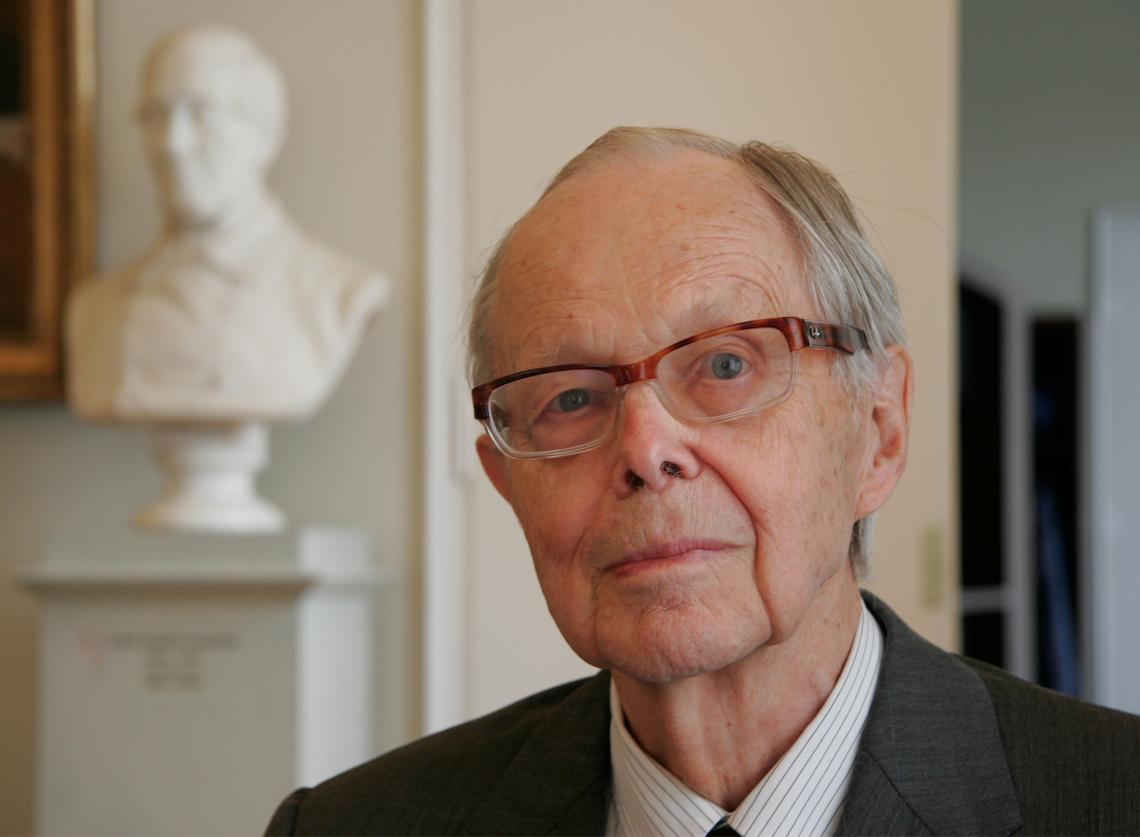
Olli Lehto (Helsinki, 2011)
Courtesy of International Mathematical Union (Source: IMU Archive)
Prologue: Professor Olli Lehto recently passed away on New Year’s Eve, on 31 December 2020. A specialist in complex analysis, Professor Lehto had a brilliant career as a mathematician at the University of Helsinki, including terms as dean of the Faculty of Science (1978-1983), as rector of the University (1983-1988) and as chancellor (1988-1993). Chairman of the Organizing Committee of the International Congress of Mathematicians held in Helsinki in 1978, he served on the Executive Committee of the International Mathematical Union from 1975 to 1990, including two terms (1983-1990) as IMU Secretary General.
A major legacy of Olli Lehto to both the IMU and ICMI communities concerns the IMU/ICMI Archive itself. In a talk [1] presented in November 2011 at the inauguration ceremony of the “Archive room”—part of the (then recently created) permanent IMU Secretariat in Berlin— Lehto spoke of the context which had led him, in the mid 1990s, to give the Archive a new start by accepting to host it at the University of Helsinki. In earlier days, “the ‘IMU Archive’ was located with the IMU Secretary of the time, and thus moved whenever a new Secretary was elected” [2]. The Archive eventually became a collection of papers stored at the ETH in Zürich [3, p. v]. At its April 1990 meeting, the IMU Executive Committee “decided that the largely unorganized archives of the Union should be properly arranged and catalogued” (ibid.). Through a series of episodes—discussed in [1] and the Preface of [3]— Lehto undertook the task of putting in order the “formidable” [3, p. v] volume of material accumulated, discarding part of it that was “irrelevant” (ibid.) and organizing it under a coherent catalogue structure. Because of his own needs in relation to his magnum opus on the history of the IMU (see below), he even contributed to the improvement of the Archive content by filling “the gaps in the collection of the IMU papers” [1, p. 3]. (Lehto describes at length in [1] his search for missing documents that finally allowed him to enrich the collection of the IMU Archive.)
With the establishment of the IMU Secretariat in Berlin in 2011 and the appointment of a bona fide archivist, the IMU Archive finally acquired a truly professional status. But the seed for this to happen had been sown two decades earlier by Olli Lehto.
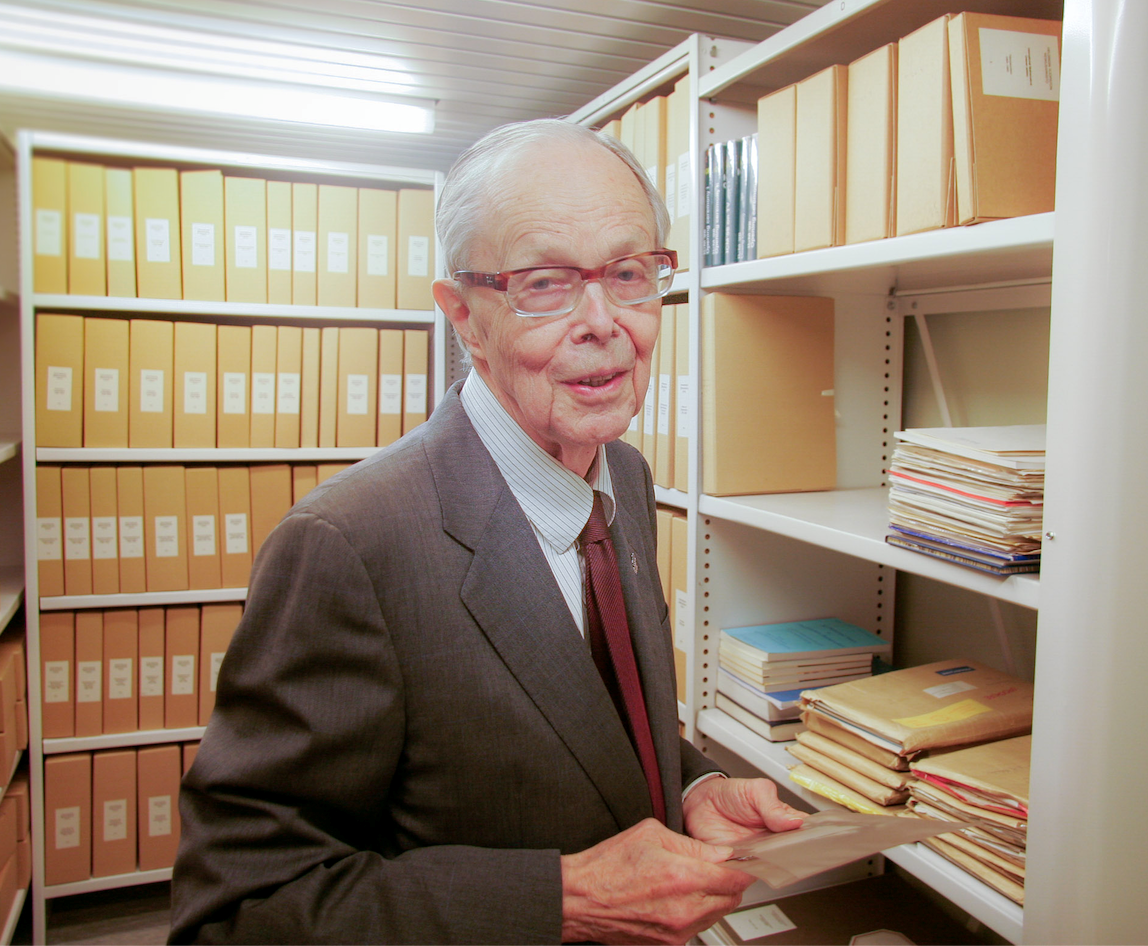
Lehto in the IMU Archive (Helsinki, 2011)
Courtesy of International Mathematical Union (Source: IMU Archive)
Another major legacy of Olli Lehto is his well-known and important book Mathematics without borders: A history of the International Mathematical Union, written [3, p. vi] at the invitation of the 1991-1994 IMU Executive Committee, with Jacques-Louis Lions as President and Jacob Palis Jr. as Secretary General. The possibility of asking Lehto to work on such a book had been raised in a letter of December 1993 from Palis to Lions [4, p. 5] and formally approved by the Executive Committee at its meeting of April 1994 [5, item 13]. Lehto comments that “unlike the move of the archives [from Zürich to Helsinki] which had been discussed before, the request to write the history [of the IMU] was quite unexpected to me” [1, p. 2]. But he eventually accepted the challenge. This resulted in a book which has become an essential source not only for understanding the whens, whys and hows related to the origins and evolution of IMU—as well as ICMI as its education commission— but also for appreciating the interaction and collaboration since the early twentieth century between these two bodies, as well as the roles they have played in promoting mathematics and mathematics education internationally.
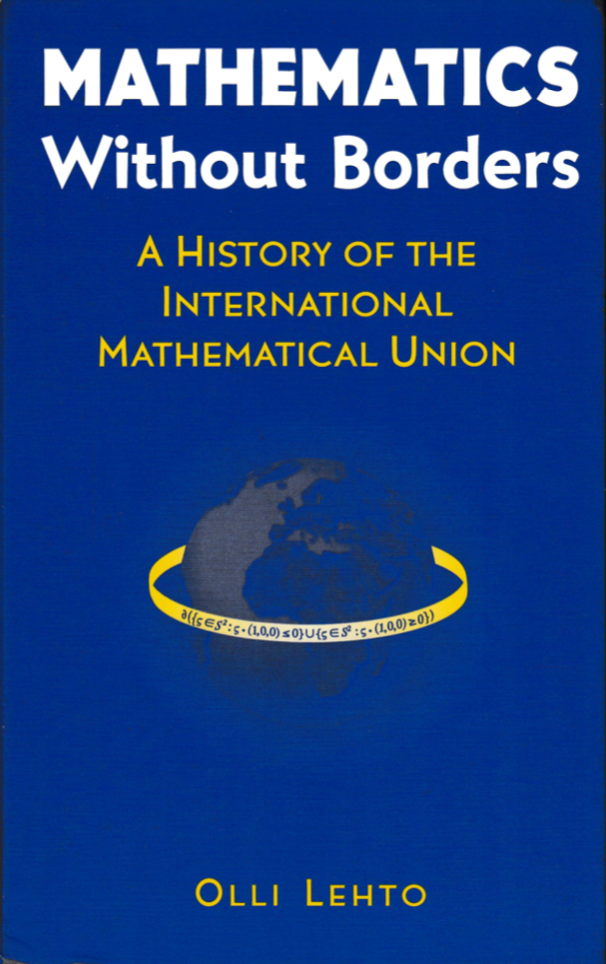 |
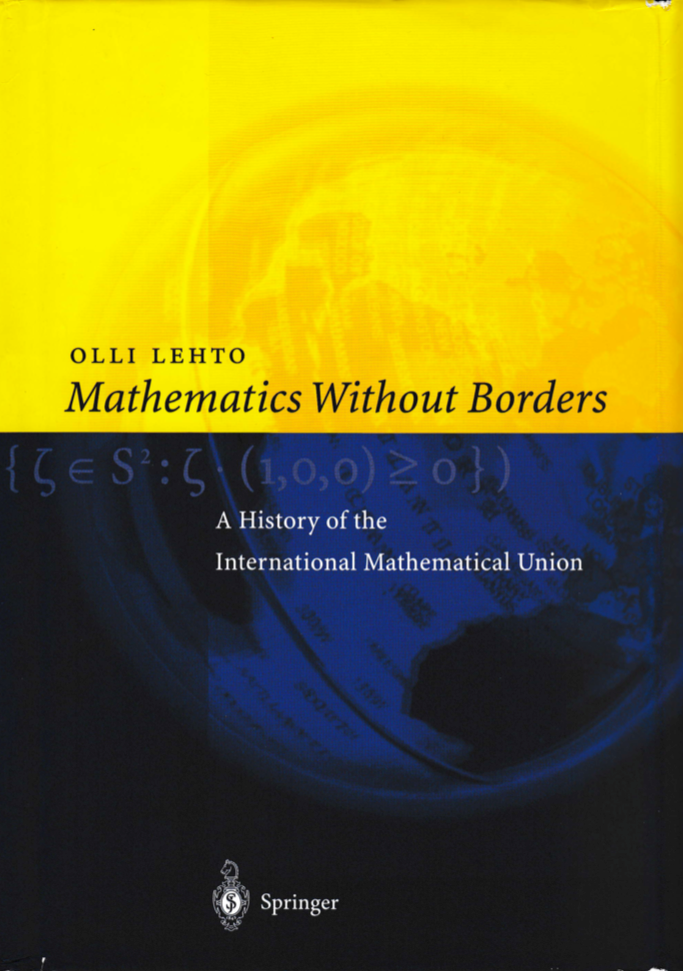 |
Lehto Mathematics without Borders
Dust jacket (left) and the front cover (right) (Source: IMU Archive)
Lehto’s book will be the main source for the rest of this vignette, where the reader will be reminded of the postponement, some 40 years ago, of a central activity of IMU, when the International Congress of Mathematicians originally planned to take place in Warsaw on 11-19 August 1982 was finally delayed to 16-24 August 1983.
ICME-14—from 2020 to 2021: Precisely a year ago, the ICMI Executive Committee, with Jill Adler as President and Abraham Arcavi as Secretary-General, was facing an extremely difficult and highly unusual decision: what should be done, in the context of the then beginning COVID-19 crisis, concerning the hosting of ICME-14 in Shanghai, originally to be held on 12-19 July 2020? As seen from today, with our current personal and collective experience of cohabitation with this terrible pandemic for more than a year, the answer may appear as totally obvious. But in early February 2020, when these issues were first raised, such was definitely not the case at all, and it took a few weeks of discussions inside ICMI circles, and also of course with the Chinese colleagues in charge of the organization of ICME-14, to come to a common and sound vision. On 13 March 2020, it was officially announced, jointly by ICMI and the ICME-14 organizers, that the congress was postponed to 2021 [6]. In the following months, various practical details about the deferred version of the congress were made public, including in particular the new dates as well as the fact that it would be organized in a hybrid mode, allowing for participation both on site and online [7].
Indeed, thanks to modern technology, various solutions can now be used to alleviate the many restrictions imposed by the COVID pandemic, notably at-a-distance activities via the internet. This is how, for instance, the election of the 2021-2024 ICMI Executive Committee by the General Assembly of ICMI was done online, as well as the (statutory) meeting of the GA, held online on 13 July 2020 (with a sequel planned for July 2021 at ICME-14). But such high-tech devices simply did not exist, four decades ago, when the 1982 ICM to be held in Warsaw was put at stake because of the political situation in Poland. (Concerning technology, the reader may be reminded here that at that time, the first versions of what was to become email were essentially related to limited projects under development, and that fax was far from being widely spread in the academic culture. Personal computers were just in their infancy. The next few decades would witness dramatic changes on all these accounts.)
In his book, Lehto devotes a full chapter, entitled Politics interferes with the IMU (1979-1986), to discuss “events of a political nature [which] interfered with the activities of the IMU with unusual force and frequency”, thus compelling “the Union to spell out the precise meaning of its apolitical status” [3, p. 211]. Some of these events have as a background the East-West Cold War, while others pertain to the issue of the membership of China within IMU (which led to the current double inscription under ‘Chinese Mathematical Society’ and ‘Mathematical Society located in Taipei, China’). Commenting on the “questions of morality” encountered notably in connection with “the principle of free circulation of scientists”, Lehto comments that in the years under scrutiny, it was “not always easy for the Union to find its way in the tangle of mathematics–politics–morality” (ibid.).
As it is impossible in this vignette to cover all the episodes and details of Lehto’s account on the Warsaw ICM saga—pp. 211-237 of the book— here are a few points worth of being highlighted. Already in the years that preceded the congress, tensions occurred between IMU and the Soviet National Committee in particular with respect to the appointment of invited speakers at the coming ICM. Still the preparation of the congress was on its way. However, the rise in Poland of the Solidarity movement, late in 1980, eventually led to martial law being imposed in the country on 13 December 1981, just eight months before the opening of the congress. This immediately raised the question of how an event such as the ICM could be organized and take place in a context of martial law, considering among other circumstances “the suspension of the Polish Mathematical Society and internment of Polish mathematicians” [3, p. 221].
In other to better assess the situation, a special visit of IMU to Warsaw was promptly organized in early February 1982, involving the IMU President and Secretary General, Lennart Carleson and Jacques-Louis Lions, jointly with Lehto himself, then a member-at-large of the IMU EC. At that time a variety of options were being considered, including a total cancellation of the Congress, leaving unchanged the course of matters, moving the IMU General Assembly to another country while organizing there a mini-congress, or delaying the GA and/or the congress itself (ibid.). As Lehto reports, “by the time of the meeting of the [IMU] Executive Committee on 1-2 April 1982, the Polish question had been under such scrutiny that reaching a decision was relatively easy” [3, p. 223]. The consensus was that “the General Assembly should take place in Warsaw”, as originally planned, and that the Congress “should not be moved to another country” (ibid.). But as regards the holding of the ICM itself, Lehto adds that “the prevailing opinion was that there were too many risks and unknowns for a Congress to be held the following August in Poland” (ibid.). Hence the IMU EC decided at that meeting to postpone the ICM, leaving the issue of the exact moment to be examined at the coming GA.
As might be expected, the ensuing debate on that specific issue, during the IMU GA held in Warsaw on 8-9 August 1982, was far from easy, as can be seen from the record of the discussions found in [8, pp. 14-26]—see also the account in [3, p. 224-229]. Considering the various pros and cons that had been raised during that meeting, sometimes possibly influenced by political considerations, the IMU General Assembly, in its wisdom it might be said, ultimately “decided to leave the final decision about the 1982 ICM to take place, or not, in Warsaw, in August 1983, to the present Executive Committee of IMU” [8, p. 26]. Comments were made during the meeting about the potential danger that a decision right at the GA on the issue under debate may harm the future of the Union. Among these comments, Czeslaw Olech, Chairman of the Organizing Committee of the Warsaw Congress and member-at-large of the IMU EC (1979-1986), expressed the opinion that “any decision taken by the Executive Committee (…) does not carry such a danger since E.C. members do not represent any country or any organization but only themselves as individuals” (ibid.). A special meeting of the IMU EC was thus scheduled in that connection in Paris on 13 November 1982. (It may be noted incidentally that because of the special context provoked by the postponement of the ICM, the 1982 Fields medalists were exceptionally announced by IMU President Carleson in his opening address at the GA, the awards, added Carleson, being “given at the Congress that we all hope can be held here next year” [8, p. 36].)
The decision to be made in Paris about the ICM was on many accounts highly nontrivial and Lehto reports on a number of preliminary episodes and on the exceptionally uneasy context [3, pp. 229-233]. An IMU EC member even announced that he considered it useless to travel all the way to Paris, “given that the probability that the Congress would be canceled was so high” [3, p. 232]. But eventually, “after a long discussion, the Executive Committee decided to confirm the organization of the ICM-82 in Warsaw in August 1983” (ibid.). Lehto notes that “the decision defied widespread general opinion” (ibid.) It was made public in particular via the Bulletin of the Union [8, p. 1]. Martial law remained in force in Poland until 22 July 1983.
In a report he presented in the name of IMU at the closing session of the 1983 ICM, Lehto emphasized “the basic principle of IMU that politics should never find a foothold within the Union. As individuals, we may of course have whatever political views we choose, but when it amounts to organized international cooperation in mathematics, then political aspects should be put aside entirely” [3, pp. 236-237].
Lehto concludes his account on that ICM, in his Mathematics without borders, with the following comment: “The opinion that the Warsaw Congress was successful has been generally endorsed and has stood up over time. After all the problems, risks, and doubts, the Warsaw ICM has served the best interests of international cooperation in mathematics.” [3, p. 237]
Additional perspectives on the 1982/1983 ICM can be found in the book [9, pp. 207-217] on the history of the ICMs written by Guillermo P. Curbera, former Curator of the IMU Archive (2007-2020).
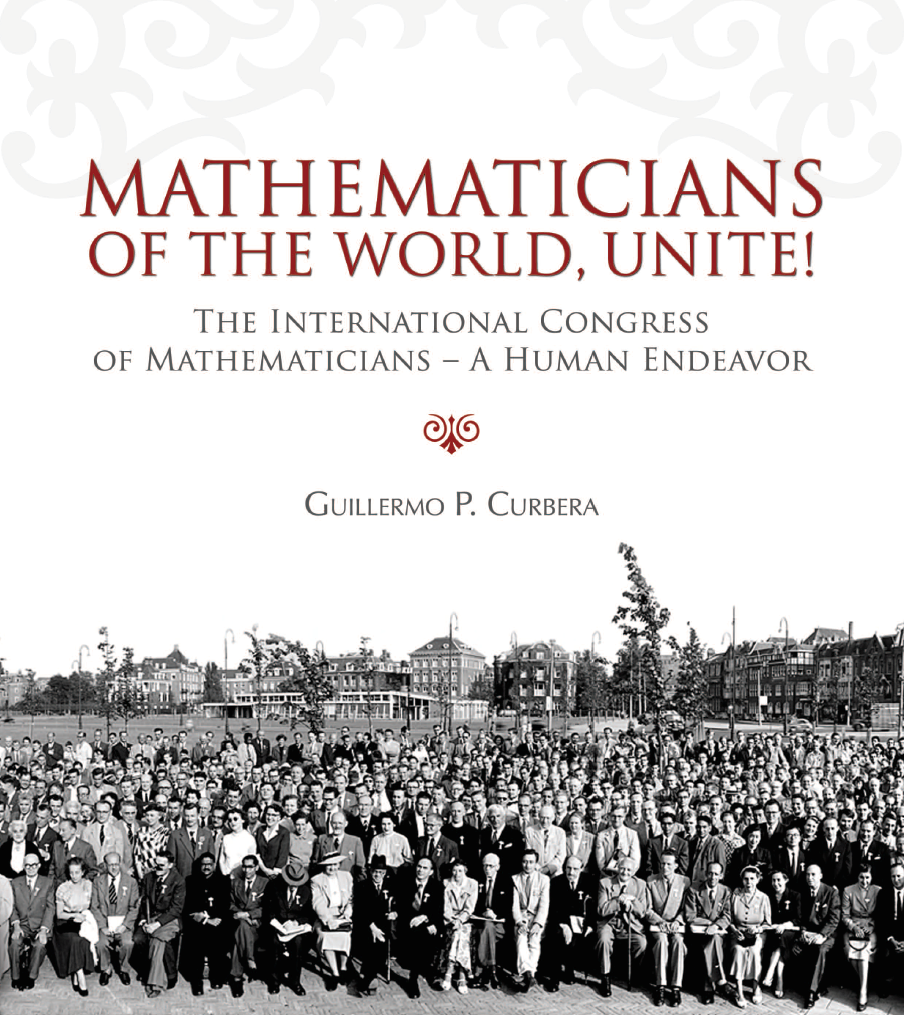
Curbera's Mathematicians of the World Unite
Dust jacket (Source: IMU Archive)
(Note: The opinions expressed in this paper are those of the author, on the basis of the sources mentioned, and not necessarily those of the IMU.)
NB: The interested reader may easily access the books by Lehto [3] and Curbera [9], both of which are freely downloadable from the IMU website [www.mathunion.org/organization/imu-history].
Sources
[1] Lehto, O. (2011). On the history of the archives of the International Mathematical Union. Address given at the inauguration of the IMU Archive at the IMU Secretariat (November 10, 2011). https://www.mathunion.org/outreach/imu-archive (Accessed on February 14, 2021) (German translation in Mitteilungen der Deutschen Mathematiker-Vereinigung 19 (2011) 220-222.)
[2] International Mathematical Union. IMU Archive. [https://www.mathunion.org/outreach/imu-archive ] (Accessed on February 14, 2021)
[3] Lehto, O. (1998). Mathematics without borders: A history of the International Mathematical Union. New York : Springer. [www.mathunion.org/organization/imu-history]
[4] Palis, J. (1993). Letter to Jacques-Louis Lions, IMU President, 10 December. IMU Archive/Subfond 7/F21.4.
[5] IMU EC Minutes (1994). Minutes of the 59th meeting of the Executive Committee of the International Mathematical Union. (Budapest, April 14-15, 1994). IMU Archive/Subfond Berlin/Ser.4.1 digital (IMU EC minutes 1991-2019).
[6] International Commission on Mathematical Instruction. ICME-14 postponed to 2021. News and Events (March 13, 2020). [www.mathunion.org/icmi/news-and-events/2020-03-13/icme-14-postponed-2021] (Accessed on February 14, 2021)
[7] International Commission on Mathematical Instruction. ICME-14 will be held as a blended (hybrid) conference. News and Events (November 6, 2020). [www.mathunion.org/icmi/news-and-events/2020-11-06/icme-14-will-be-held-blended-hybrid-conference] (Accessed on February 14, 2021)
[8] International Mathematical Union (1982). Record of the ninth General Assembly of the International Mathematical Union. IMU Bulletin 19 (December 1982) 3-47. https://www.mathunion.org/membership/imu-bulletins
[9] Curbera, Guillermo P. (2009). Mathematicians of the world, unite! The International Congress of Mathematicians—A human endeavor. Wellesley, MA : A.K. Peters.https://www.mathunion.org/organization/imu-history
5. ICME-14 updates
The 14th International Congress on Mathematical Education ICME-14 will be held from July 11-18, 2021.
Considering the current situation and potential development of COVID19, the ICME-14 Chair and LOC together with the ICMI Presidents, Vice Presidents and Secretaries General (incumbent and incoming) decided in a joint online meeting in October, 2020 that ICME-14 will be held in a hybrid mode, i.e., it will be held simultaneously in Shanghai (face-to-face) as well as online.
Taking into account the many time zones around the world, the new schedule is divided into two parts: a 3.5h core time starting 19:30 Shanghai time (04:30 in Los Angeles, 06:30 in Mexico City, 07:30 in New York, 12:30 in London, 13:30 in Geneva, 17:00 in Delhi, 21:30 in Sydney and 23:30 in Auckland – all times using 24-hour clock). During the core time, the Opening and Closing ceremonies, one Plenary lecture, Plenary Panels 1-3, the Discussion groups, two sessions of each TSG, sessions to interact with the awardees and plenary speakers, as well as a Chinese art and cultural performance will be held. Between 14:30 and 18:00 Shanghai time the remaining program will be held. The Early Career Research Day will start at 08:30 Shanghai time. For details, please visit here: https://www.icme14.org/static/en/news/72.html?v=1611624888513 and see the timetable below.
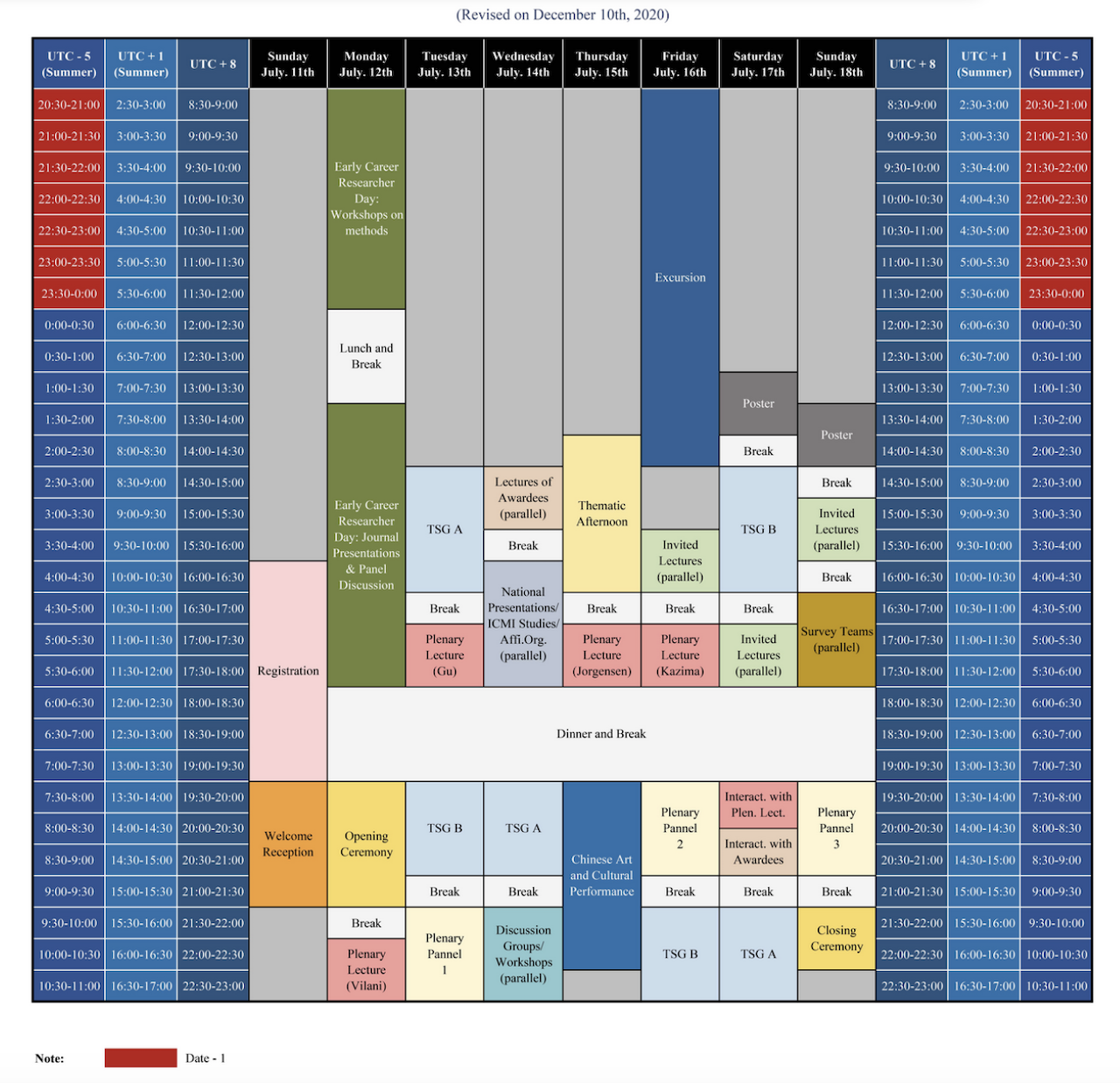
It is planned that the online conference tool Zoom will be used.
Also, a new scheme of registration fees has been decided (updated on December 8, 2020):
For physical attendance:
- Fully paid before (inclusive) March 31st, 2021, RMB 3 500;
- Fully paid between April 1st and May 31st, 2021, RMB 3 800;
- Paid on or after June 1st, 2021, RMB 4 000;
- Accompanying person's registration, any time, RMB 1 000
For online attendance:
- RMB 2 000, anytime
Extra charge for Early Career Researcher Day:
- RMB 350 for physical attendance
- RMB 200 for online attendance
The attendance code for online participants will be issued upon receipt of the registration fee. Participants need to pay the fee in advance, leaving enough time for banks to process the remittance.
The attendance code can be used on different devices, but not simultaneously.
Participants who have already paid the registration fee but who decide not to attend the congress or who change from physical attendance to online attendance will be refunded the difference in the registration fee.
The local organizer will not be responsible for paying the transfer charge by the banks in participants’ own countries. However, paying the receiving charge to Shanghai local banks is the duty of the local organizer.
It is important for participants planning to attend ICME-14 in person to allow enough time to obtain a visa in light of the stricter border controls operating during the global pandemic
Both ICMI as well as the ICME-14 organizers hope that this decision will help participants to plan their attendance of ICME-14 beforehand.
6. Three CANP SpringerBriefs Publications are now available open access
The Capacity and Networking Project (CANP) is a major development focus of ICMI which is also supported by IMU. It consists of an ongoing series of Programs in different developing regions and aims to develop the educational capacity of those responsible for mathematics teachers, and create sustained and effective regional networks of teachers, mathematics educators and mathematicians, by linking them to international support.
Through the CANP, several publications documenting the experiences and ideas in Mathematics Education in different regions have been produced.
In 2020, the ICMI EC 2017-2020 negotiated the open access of several ICMI publications. We are happy to announce that all three CANP SpringerBriefs Publications are available for open access with immediate effect.
- Mathematics Teacher Preparation in Central American and Caribbean
- Mathematics Education in East Africa Towards Harmonization and Enhancement of Education Quality
- Mathematics Teacher Education in the Andean Region and Paraguay
ICMI Study 23 volume is also available open access.
7. ICMI Affiliated Organizations
In its last meeting, after a long reflection on this matter, the ICMI EC has decided to rethink the status of affiliated organizations, study groups and regional conferences. Indeed, redundant and sometimes contradictory information appeared in different parts of our website.
From now on, there will be only one section on affiliated organizations, divided into Thematic Affiliated Organizations with a wide international audience and specific interests related to mathematics education and Regional Affiliated Organizations based on a regional scope, yet involving as many countries in the region as possible and opening it up for wide international participation. A region can be either geographically or linguistically determined.
The organizations affiliated to ICMI are independent from the Commission, being neither appointed by ICMI nor operating on behalf or under the control of ICMI, and they are self-financed. However, they collaborate with ICMI on specific activities, such as the ICMI Studies or components of the program of the ICME Congresses. The ICMI Affiliated Organizations produce quadrennial reports to be presented to the General Assembly of ICMI, and a brief annual report on their activities for the ICMI annual report. Each of the Affiliated Organizations holds separate meetings on a more or less regular basis.
The ICMI Executive Committee (EC) has adopted guidelines and criteria about (minimum) requirements for granting the status of an ICMI Affiliated Organization. Details (and an application form) are accessible on the website : https://www.mathunion.org/icmi/organization/affiliated-organizations
There are currently eight ICMI Thematic Affiliated Organizations:
- CIEAEM: International Commission for the Study and Improvement of Mathematics Teaching
- HPM: The International Study Group on the Relations between the History and Pedagogy of Mathematics
- ICTMA: The International Study Group for Mathematical Modelling and Applications
- ISDDE: International Society for Design and Development in Education
- IOWME: The International Organization of Women and Mathematics Education
- MCG: The International Group for Mathematical Creativity and Giftedness
- PME: The International Group for the Psychology of Mathematics Education
- WFNMC: The World Federation of National Mathematics Competitions and
eight ICMI Regional Affiliated Organizations:
- ADiMA – Association of Western and North African Didacticians of Mathematics
- AFRICME - African Regional Congress on Mathematical Education
- CIAEM / IACME - Conferencia interamericana de educación matemática / Inter-American Conference on Mathematical Education
- CIBEM – Congresso Iberoamericano de Educação Matemática
- EARCOME - East Asia Regional Conferences in Mathematics Education
- EMF – Espace Mathématique Francophone
- ERME – European Society for Research in Mathematics Education
- MERGA – Mathematics Education Research Group of Australasia
8. The Commission for Developing Countries of the IMU
Mission and activities
Olga Gil-Medrano. Secretary for Policy of IMU-CDC
It’s a pleasure to write a short introduction to the work of this commission and to disseminate the information about the different programs to encourage applications from readers.
Mission
The Commission for Developing Countries (CDC) aims to design and carry out IMU activities focused on the development of mathematics in those countries with the greatest difficulties, either due to the lack of adequate structures or the shortage of economic resources. The Commission, created in the General Assembly (GA) that took place in Bangalore (India) in 2010, exists since January 2011 and is the heir of other previous IMU structures, since international solidarity with mathematicians who are in less favored situations has been a constant of the IMU in its one hundred years of existence.
The work of the CDC follows the four-year cycle pattern set by the ICMs. Six of the CDC members are elected by the GA: President, Secretary for Policy, Secretary for Grants Selection and one member from Africa, Asia and Latin America, respectively. IMU President is an ex-officio member, ICMI appoints a representative and IMU Executive Committee (EC) appoints two more members and designates an EC liaison member.
The definition of a developing country that IMU is applying during the four-year period in all its activities is one of the tasks of the CDC. The complete list in alphabetic order can be seen in https://www.mathunion.org/cdc/about-cdc/definition-developing-countries
Activities
Some of the programs are open for applications in continuity with several deadlines every year. Among them are the Conference Support Program that provides partial support to conferences and research schools and the Volunteer Lecturer Program that offers to universities in developing countries the economic support to host volunteer lecturers for intensive 3-4 week advanced courses.
The research travel grants support mathematicians professionally based in developing countries to visit an international research collaborator for a period of one month. Three programs are devoted to this purpose: the Individual Travel Support Program, the IMU-Simons African Fellowship Program and the Abel Visiting Scholar Program addressed to young mathematicians.
IMU-CDC opens every year one call for applications to two programs offering fellowships for graduate students: the IMU Breakout Graduate Fellowships Program offers full-time research grants for excellent students from developing countries following studies leading to a PhD degree, in a developing country (the deadline is May 31, 2021); and the GRAID (Graduate Assistantships in Developing Countries) Program providing modest support for emerging research groups, working in a developing country listed in Priority 1 or 2, in order to allow them to fund their most talented students to study full-time and pursue a Master’s or PhD graduate degree (the deadline is March 15, 2021).
Finally, CDC also provides financial support to projects whose development is due to other groups or organizations, such as the Capacity and Networking Project (CANP) of ICMI. CDC opens a call for applications to the Project Support Program when funds are available; in particular a call is now open till May 31, 2021.
The necessary financial contribution for these programs comes from the stable allocation that the GA grants to the CDC in the IMU budget, to which are added the generous contributions from all the winners of the Breakthrough Prizes in Mathematics, the Simon’s Foundation (USA), the Niels Henrik Abel Board (Norway), the American Mathematical Society, Japanese Mathematical Society, Swiss Mathematical Society, Italian Mathematical Union and about one thousand individual mathematicians. On average, the activities of the CDC obtain two-thirds of their total funding from these external sources.
Within the economic and administrative limits of an International Union, these efforts are a reflection of – and we expect a stimulus for – the solidarity work of the international mathematical community in helping mathematical development in countries in difficulty, through very different initiatives and especially the work of many volunteers.
9. Cheryl Praeger’s distinction as Companion of the Order of Australia
Merrilyn Goos
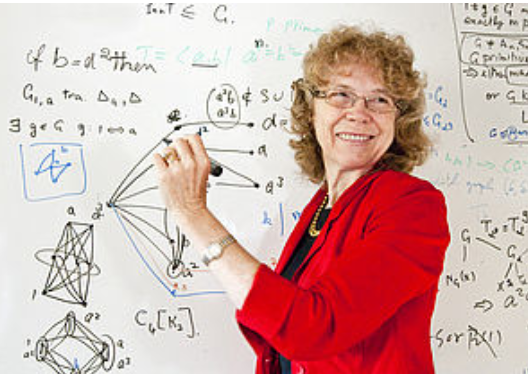 We are delighted to share the news that former ICMI Vice-President (2013-2016) Cheryl Praeger has been appointed a Companion in the Order of Australia (AC). This is a rare and prestigious distinction that recognizes individuals for eminent achievement and merit of the highest degree in service to Australia or to humanity at large. Cheryl is Emeritus Professor of Mathematics at the University of Western Australia, and as one of Australia’s leading mathematicians she has won many distinguished awards. She was the first pure mathematician to win the Prime Minister’s Prize for Science (2019), the first pure mathematician to be awarded an Australian Research Council Federation Fellowship (2007-2012), the first Australian-based mathematician to be elected to the Executive of the International Mathematical Union (2007-2010, 2011-2014), and the first woman to serve as President of the Australian Mathematical Society (1992-1994).
We are delighted to share the news that former ICMI Vice-President (2013-2016) Cheryl Praeger has been appointed a Companion in the Order of Australia (AC). This is a rare and prestigious distinction that recognizes individuals for eminent achievement and merit of the highest degree in service to Australia or to humanity at large. Cheryl is Emeritus Professor of Mathematics at the University of Western Australia, and as one of Australia’s leading mathematicians she has won many distinguished awards. She was the first pure mathematician to win the Prime Minister’s Prize for Science (2019), the first pure mathematician to be awarded an Australian Research Council Federation Fellowship (2007-2012), the first Australian-based mathematician to be elected to the Executive of the International Mathematical Union (2007-2010, 2011-2014), and the first woman to serve as President of the Australian Mathematical Society (1992-1994).
Cheryl’s mathematical research in group theory and symmetry, while highly theoretical, has important applications in computer programming, cryptography, and many other areas of science. Through her membership and chairing of boards and committees (e.g., Australian Mathematical Olympiad Committee, Prime Minister’s Science Council, Association of Academies and Societies for Science in Asia), she has also made a significant contribution to the development and direction of mathematics and mathematics education in Australia and internationally.
Cheryl discovered her love of mathematics while a student in high school, at a time when girls were often advised not to study mathematics or to consider a career in this field. Yet these views only made her more determined to learn as much mathematics as possible, and after completing bachelor’s and master’s degrees at The University of Queensland she won a scholarship to undertake a doctorate at the University of Oxford. In 1983, when she was appointed to the Chair in Mathematics at the University of Western Australia, she was the only woman in Australia to hold such a position.
Cheryl has championed the case for increasing participation of girls and women in mathematics and in all the STEM (science, technology, engineering and mathematics) disciplines. She continues to mentor and encourage young people to grasp all the opportunities they can, especially when there is now more need than ever for mathematicians to help solve today’s real-world problems.
Photo courtesy of The University of Western Australia
10. Alicia Dickenstein receives the L'Oréal-UNESCO International Award For Women in Science
“What we have in Common” – Celebrating (with) Alicia Dickenstein
Abraham Arcavi
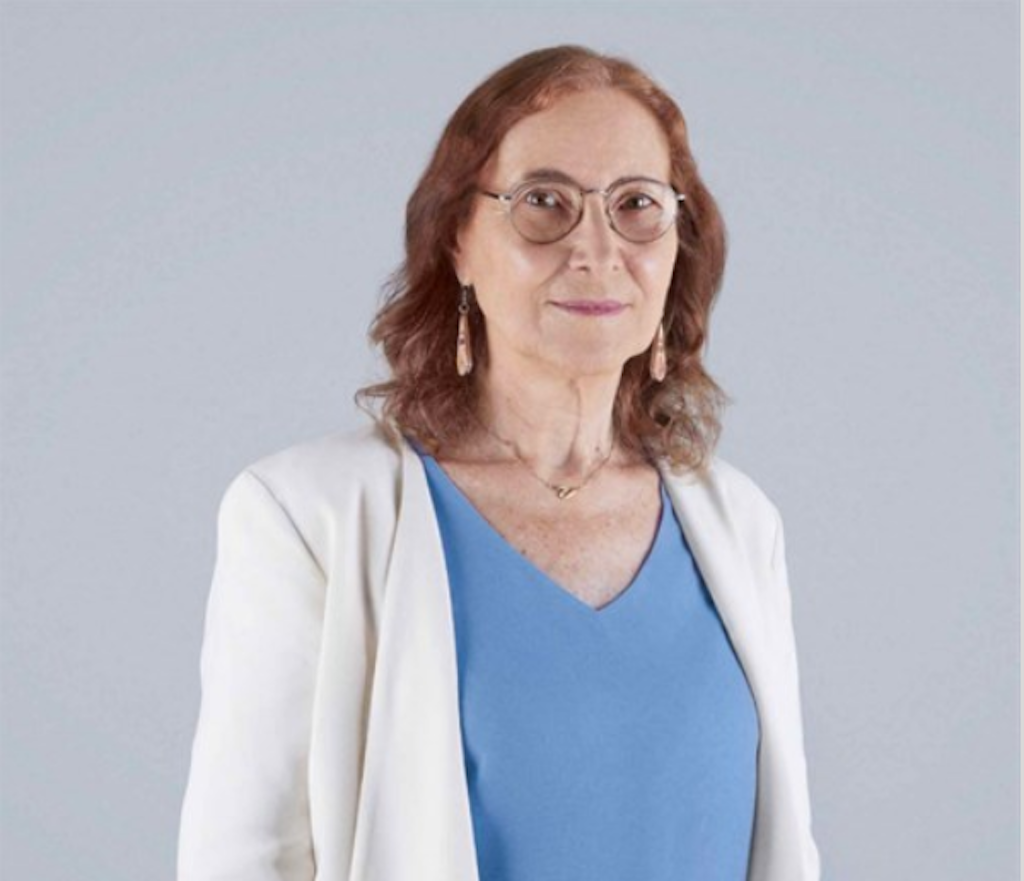 Alicia Dickenstein, a mathematics professor at the University of Buenos Aires (UBA), recently received the L'Oréal-UNESCO For Women in Science International Award for “her outstanding contributions at the forefront of mathematical innovation by leveraging algebraic geometry in the field of molecular biology.” (https://www.mathunion.org/cwm/news-and-events/2021-02-11/alicia-dickenstein-receives-one-five-loreal-unesco-international). This is one further international recognition among many others of her amazing career as a world-class mathematician, for example: the TWAS Prize from The World Academy of Sciences for the Advancement of Science in Developing Countries, Fellow of the American Mathematical Society, and SIAM Fellow.
Alicia Dickenstein, a mathematics professor at the University of Buenos Aires (UBA), recently received the L'Oréal-UNESCO For Women in Science International Award for “her outstanding contributions at the forefront of mathematical innovation by leveraging algebraic geometry in the field of molecular biology.” (https://www.mathunion.org/cwm/news-and-events/2021-02-11/alicia-dickenstein-receives-one-five-loreal-unesco-international). This is one further international recognition among many others of her amazing career as a world-class mathematician, for example: the TWAS Prize from The World Academy of Sciences for the Advancement of Science in Developing Countries, Fellow of the American Mathematical Society, and SIAM Fellow.
In her position as the Vice President of IMU (2015-2018), Alicia took several roles in the International Commission on Mathematical Instruction (ICMI) as a past member of its Executive Committee and as a current member of the International Program Committee of ICME-14, which will take place in Shanghai (partly online) in July 2021. Her dedication to education and her care for details in all ICMI-ICME related matters is laudable, in particular her striving for building bridges between mathematics educators and mathematicians. At the ICMI General Assembly in Hamburg on July 24, 2016, Alicia delivered a lovely presentation entitled “Mathematicians and Math Educators” and her first slide read as follows: “What we have in common: love for mathematics and the social responsibility to ‘mathematize’ mathematics”. By mathematize in this context she meant the development of mathematical literacy. In a further slide she expressed her basic credo: “Mathematics is a human activity (and so, very democratic: we all have the same circuits in our brains)” of sense making. She went on by echoing the words of Hans Freudenthal (mathematician and mathematics educator and ICMI Past President, 1967-1970): mathematics should be for all and should provide enjoyment of learning and wise uses (Freudenthal’s inaugural address at ICME-1, held in Lyon, France, on August 24-31, 1969, published in Educational Studies in Mathematics (2) in 1969). Alicia adds that this quote states that both enjoyment and wise uses of mathematics are the core of the everlasting, timeless and consensual aims of mathematics education worldwide. She ended this presentation with a call to mathematicians and mathematics educators to strengthen collaborations. Alicia’s dedication to ICMI related work demonstrated that this was not an empty call, it was followed by example, by actions and by devoting time and efforts to substantiate her call.
Her activities in mathematics education started long before her involvement with the IMU and ICMI. In 2000, she published a charming book for young children titled “Mate Max: La matemática en todas partes” (Mathematics everywhere) in which she picks pertinent real-world situations that engage and motivate young children to solve problems.
On a personal note: I remember many lively conversations with Alicia, since the very first time when we made an appointment in a café in Buenos Aires to get to know each other, through the chats in the breaks of the ICMI or ICME meetings, including a very long taxi ride we shared at the Shanghai airport our way to the ICMI IPC meeting. ICMI, and I personally, celebrate and congratulate Alicia on her mathematical achievements and for her work in and for ICMI, and wish her plenty of future achievements having always in mind mathematics education.
11. Participate in the International Day of Mathematics 2021 (IDM 2021)
The theme of the International Day of Mathematics 2021 on March 14, 2021 is "Mathematics for a Better World". In view of the pandemic, it is highly likely that it will not be possible to hold events for the general public. It is therefore recommended that celebrations be planned in schools and colleges during class time or as extracurricular activities. Since March 14, 2021 is a Sunday, schools and colleges may choose to celebrate around March 14, for example Friday, March 12 and/or Monday, March 15. Please pass the invitation to the school network(s) of your country and/or all the schools with which you are in contact. Here you can find suggestions for what to do on the International Day of Mathematics: https://www.idm314.org/organize.html
It is also possible to submit plans of an event to the IDM event map: https://form.jotform.com/imaginaryorg/idm-event-submission
Check out the Mathematics for a Better World Poster Challenge and the live event which will be held online. To receive the IDM 2021 announcements, subscribe to the newsletter via this direct link.
12. Conferences to come
14th International Congress on Mathematical Education (ICME-14), from July 11 to 18, 2021, Shanghai, China, http://www.icme14.org/static/en/index.html
ICME-15 will take place in Sydney, Australia on July 7-14, 2024.
The ICHME7 (Seventh International Conference on the History of Mathematics Education) will be postponed from September 20-24, 2021 to September 19-23, 2022. The conference venue remains Mainz in Germany.
The EMF2021 symposium was scheduled to take place in Cotonou, Benin from 11 to 17 December 2021. Due to the COVID19 pandemic, the scientific committee is considering either holding the conference as a hybrid event or postponing it. This decision will be taken soon. For up to date information, please consult http://emf.unige.ch/emf2021/